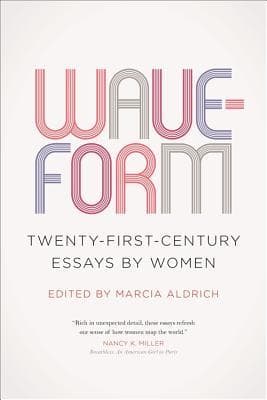
Book Review Summary: Waveform: Twenty-First-Century Essays by Women
Introduction
Waveform: Twenty-First-Century Essays by Women is an anthology that celebrates the role of women essayists in contemporary literature. With thirty essays by thirty distinguished and diverse women writers, this collection expands the dynamic genre's boundaries and tests its edges. The essays range from traditional to experimental, exploring form through collage, fragments, segmentation, braids, triptychs, and diptychs. The collection presents a diverse range of women's experiences, showcasing their interaction with various subjects and circumstances through style, voice, tone, and structure.
About Marcia Aldrich
Marcia Aldrich, the editor of Waveform, is an accomplished writer and educator. She was born in Allentown, Pennsylvania, and raised in that very spot by her parents and half sisters. Aldrich graduated from Pomona College and earned a doctorate in English at the University of Washington. She currently teaches creative writing at Michigan State University. From 2008 to 2011, Aldrich edited "Fourth Genre," one of the premiere literary journals featuring personal essays and memoirs. Her own essay, "Girl Rearing," tells the story of her upbringing. Aldrich brings her expertise and passion for women's writing to the editorial role in Waveform, creating a collection that highlights the diversity and innovation of contemporary women essayists.
Analysis of Views
-
Varying Forms: Readers appreciate the wide variety of forms present in the collection, ranging from sandwiched images to found words. The variety of forms keeps readers engaged and provides a rich reading experience.
-
Diverse Topics: The essays cover a wide range of subjects, including motherhood, sexual violence, and girls growing up. However, they also explore other topics such as gun ownership, race, and leaving. Readers appreciate the depth and breadth of the women's experiences represented in the collection.
-
Moving Stories: Many readers found the essays deeply moving and impactful. They appreciated the thought-provoking nature of the stories and the way they explored various aspects of women's lives. Some essays stood out as particularly powerful, such as "Portrait of a Family: Crooked and Straight" by Wendy Rawlings, "Grand Unified Theory of Female Pain" by Leslie Jamison, and "The Girl, The Cop, and I" by Laurie Lynn Drummond.
-
Innovative Writing: Readers praised the collection for its innovative writing styles and experimental approaches to form. They appreciated the way the authors pushed boundaries and experimented with structure, creating unique and engaging pieces.
-
Wide Range of Voices: The anthology showcases a diverse range of women's voices, representing various backgrounds and experiences. Readers appreciated the opportunity to discover new authors and explore different perspectives.
Reasons for Recommendation
-
Innovative Forms: The collection's innovative forms and experimental approaches to structure make it stand out from other essay collections. Readers appreciate the variety of forms presented in the book.
-
Diverse Topics: The collection covers a wide range of topics related to women's experiences, providing readers with a comprehensive understanding of various aspects of women's lives. Readers find this diversity both enlightening and engaging.
-
Moving Stories: Many readers found the essays deeply moving and impactful. They appreciate the way the authors explore complex issues and offer thought-provoking insights into women's lives. The emotional resonance of these stories makes Waveform a highly recommended read.
Reasons for Not Recommendation
-
Depressing Content: Some readers found the collection depressing due to the prevalence of negative experiences discussed by the authors. They felt overwhelmed by the portrayal of women's struggles and questioned why their own lives were not as challenging.
-
Limited Accessibility: A few readers expressed concerns about the accessibility of certain essays due to their experimental nature or dense prose. They found certain pieces challenging to read or understand fully. However, it is worth noting that these concerns are subjective and may vary among readers.
Conclusion
Waveform: Twenty-First-Century Essays by Women is an anthology that celebrates the contributions of women essayists in contemporary literature. With thirty essays by thirty distinguished and diverse women writers, this collection offers a wide range of forms, diverse topics, moving stories, innovative writing styles, and a wide range of voices. While some readers found certain essays depressing or challenging due to their experimental nature or dense prose, others appreciated the innovative forms and diverse perspectives presented in the collection. Overall, Waveform is a highly recommended read for those interested in exploring contemporary women's essays and seeking thought-provoking insights into women's lives.